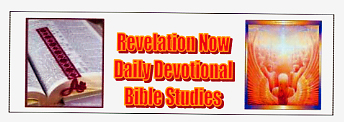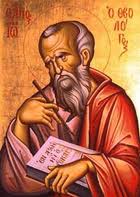
| Next | Previous | Index | Tellout Home |
84. Come Spirit Bride
Revelation 22.17-18
"The Spirit and the bride say, 'Come!' And let the hearer say, 'Come!' Let the thirsty one come and let the one who wishes take the life water gift. I warn everyone hearing the scroll's prophecy words: If anyone adds anything to them, God will add to that person the plagues described in this scroll." (Revelation 22.17-18) ✞
Deepest Spiritual Needs
The risen Christ himself is the speaker to the seven churches. This passage has two different interpretations. The Biblical scholar H. B. Swete (1835-1917) takes the first two parts as appeals to Christ to fulfill his promise and come quickly back to this world. He takes the third part as the thirsty soul's invitation to come to Christ. The second interpretation is that the whole passage is a come-to-Christ summons. There is the call, "Come Spirit Bride." The bride is the church. He is always calling us back to God to receive life's water! The Spirit and the bride tell the seven churches to fulfill their deepest spiritual needs and urge them to "Come to Christ." In Revelation 2.7, the seven church's letters end with the Holy Spirit's call, 'Come to Christ.' John of Patmos writes, "Whoever has ears, let them hear what the Spirit says to the churches. To the victorious one, I will give the right to eat from the tree of life, which is in God's paradise." ✞
Isaiah's Great Invitation
 The Holy Spirit and the Bride invite everyone to receive the living water gift. They encourage all to join the call to accept everything that the Holy Spirit and the Bride offer. They help them by saying, "The Spirit and the bride say, 'Come!' And let the hearer say, 'Come!' Let the thirsty one come, and let the one who wishes take the living water gift." The "invitation to come" is issued to all thirsty souls to satisfy their deepest spiritual needs. Jesus repeats this call in John 6.35, "I am the living bread. Whoever comes to me will never go hungry, and whoever believes in me will never be thirsty." Isaiah's great invitation in Isaiah 55.1 also says, "Come, all you thirsty, come to the waters; and you without money, come, buy and eat! Come, buy wine and milk without money and cost." We are all invited to come to Christ! ✞
The Holy Spirit and the Bride invite everyone to receive the living water gift. They encourage all to join the call to accept everything that the Holy Spirit and the Bride offer. They help them by saying, "The Spirit and the bride say, 'Come!' And let the hearer say, 'Come!' Let the thirsty one come, and let the one who wishes take the living water gift." The "invitation to come" is issued to all thirsty souls to satisfy their deepest spiritual needs. Jesus repeats this call in John 6.35, "I am the living bread. Whoever comes to me will never go hungry, and whoever believes in me will never be thirsty." Isaiah's great invitation in Isaiah 55.1 also says, "Come, all you thirsty, come to the waters; and you without money, come, buy and eat! Come, buy wine and milk without money and cost." We are all invited to come to Christ! ✞
Changing Word Warning
Revelation issues a warning against altering the Bible text. Those who twist, add to, change the meaning, or remove scripture will come under God's curse. Certain things stand out in this solemn warning against changing scripture's words. It warns against distorting the book's text by altering it by even a single word. Saint Paul writes in Galatians 1.8-9, "But even if we, or a heavenly angel, should preach another gospel than what we preached to you, let them be under God's curse!" To alter the actual wording and meaning is such a severe offense that Saint Paul repeats this warning. Changing the sense and, therefore, the truth itself must not happen. This ancient book's end warning is far from unique. Many early writers commonly finished their manuscripts with an alarm. We find similar counsel in other Biblical passages. Deuteronomy 4.2 orders, "Do not add to what I command you and do not subtract from it, but keep the Lord your God's commands that I give you." Proverbs 30.5-6 says, "Every one of God's words is flawless; he is a shield to those who take refuge in him. Do not add to his words, or he will rebuke you and prove you a liar." Finally, in the Book of Enoch 104.10, an ancient religious work ascribed to Noah's great-grandfather dating from BC 300 and included in the biblical canon by the Ethiopian Orthodox Church, the writer insists that no one should "change or diminish any of my words." ✞
Solemn Appeal
 Adding or omitting words or changing the scripture's meaning brings a solemn appeal. The Letter of Aristeas 310, 311, tells how seventy Jewish scholars in the 2nd century BC translated the Greek version of the Hebrew Bible, called the Septuagint, at the Egyptian King's order. On completion, "they bade them pronounce a curse upon any who should make any alteration, allow an omission, or change the written words in any way!" In his book's preface "On Origins," Tyrannius Rufinus (340-410 AD), a monk, historian, and theologian, added a similar solemn appeal. "In the sight of God the Father, Jesus the Son, and the Holy Spirit, anyone who read or copied this book is not to add, subtract, insert, or alter anything!" Eusebius (263-339 AD), the Caesarean Church Bishop, wrote in "Ecclesiastical History 5.20.2" how Irenaeus (130-202 AD), the great second-century Christian scholar, ended one of his books. "I make a solemn appeal to anyone who copies this book, by our Lord Jesus Christ, and by his glorious advent, when he comes to judge the quick and the dead. Compare what you write, and correct it carefully by this manuscript, and also write this earnest solemn appeal, and place it on your copy!" ✞
Adding or omitting words or changing the scripture's meaning brings a solemn appeal. The Letter of Aristeas 310, 311, tells how seventy Jewish scholars in the 2nd century BC translated the Greek version of the Hebrew Bible, called the Septuagint, at the Egyptian King's order. On completion, "they bade them pronounce a curse upon any who should make any alteration, allow an omission, or change the written words in any way!" In his book's preface "On Origins," Tyrannius Rufinus (340-410 AD), a monk, historian, and theologian, added a similar solemn appeal. "In the sight of God the Father, Jesus the Son, and the Holy Spirit, anyone who read or copied this book is not to add, subtract, insert, or alter anything!" Eusebius (263-339 AD), the Caesarean Church Bishop, wrote in "Ecclesiastical History 5.20.2" how Irenaeus (130-202 AD), the great second-century Christian scholar, ended one of his books. "I make a solemn appeal to anyone who copies this book, by our Lord Jesus Christ, and by his glorious advent, when he comes to judge the quick and the dead. Compare what you write, and correct it carefully by this manuscript, and also write this earnest solemn appeal, and place it on your copy!" ✞
Wicked Bible Error
The "wicked Bible error" was a terrible mistake. In ancient days, all books were hand-copied by scribes, and a copyist could not make a single mistake. If a Middle Ages scribe found even one document error in a manuscript that may have taken months to copy, they destroyed it. Such was the importance of adhering precisely to the original text. It was customary for the writer to insert a solemn warning against change at the book's end and add a blessing to his manuscript. In 1631 AD, the "Wicked Bible," also called the "Adulterers' Bible," or the "Sinners' Bible," was produced on a press run of a thousand copies by the London Royal Printers. A year later, they discovered a mistake in verse fourteen of the seventh commandment, omitting "not" and reading, "thou shalt commit adultery!" The Archbishop of Canterbury, in response, wrote, "experts carefully produced the printing, the Bibles especially. Grave and learned men worked with good compositors and the best correctors. The paper and fine letters are in every way the best, but now the paper is of nothing, the composers' boys, and the correctors unlearned." King Charles 1 furiously ordered the burning of every "Wicked Bible." Only a few escaped, and only nine copies exist today. Bonhams auctioned one in London in 2015, priced at $99,500. ✞
Scandalous Mistake
A single error resulted in a massive fine in 1631 of $600 or $60,000 today on Robert Barker and Martin Lewis. They had their publishers' licenses taken away, the entire edition withdrawn, and every known copy burned. King Charles 1st and the Archbishop of Canterbury made a joint statement condemning the wicked Bible omission. "His Majesties printers, at or about this time, had committed a scandalous mistake in our English Bibles by leaving out the word "not" in the Seventh Commandment. Being made acquainted with it by the Bishop of London, His Majesty gave an order calling the Printers to the High-Commission, after which evidence of the fact, the whole impression was called in, and the Printers harshly punished, as they deserved. With some of this fine." The omission of the word "not" is still guarded against in some areas of life. The Associated Press today advises reporters to use "innocent" instead of "not guilty" to prevent misunderstandings in court proceedings should the "not" be omitted by mistake! ✞
Jesus Christ Come
The Holy Spirit and the bride say, 'Come Jesus Christ.' Many Biblical passages tell us that Jesus is coming soon. John of Patmos writes several times, "Come Spirit Bride." Indeed, Christ may appear at any moment, and that is clear from Revelation 22.7, "Look, I am coming soon!" Revelation 22.10 advises, "the time is near.'" Revelation 22.12 warns, "Look, I am coming soon! My reward is with me, and I will give to each person according to what they have done." Revelation 22.20 adds, "He who testifies to these things says, 'Yes, I am coming soon.' Amen. Come, Lord Jesus." "Behold, I am coming soon" is this chapter's repeated refrain. In Jesus Christ alone, the soul's longing can be satisfied. ✞
"Come Spirit Bride"
by Ron Meacock © 2021
| ^Top Page | Next | Previous |